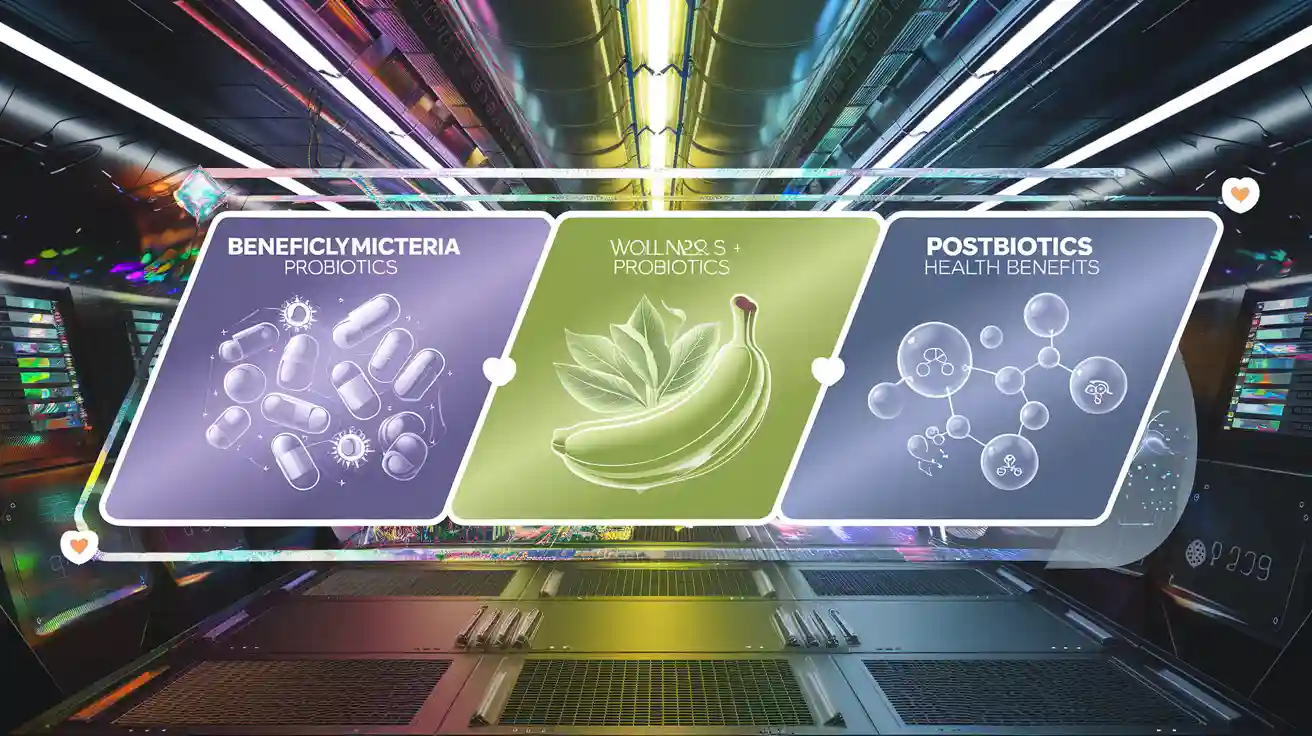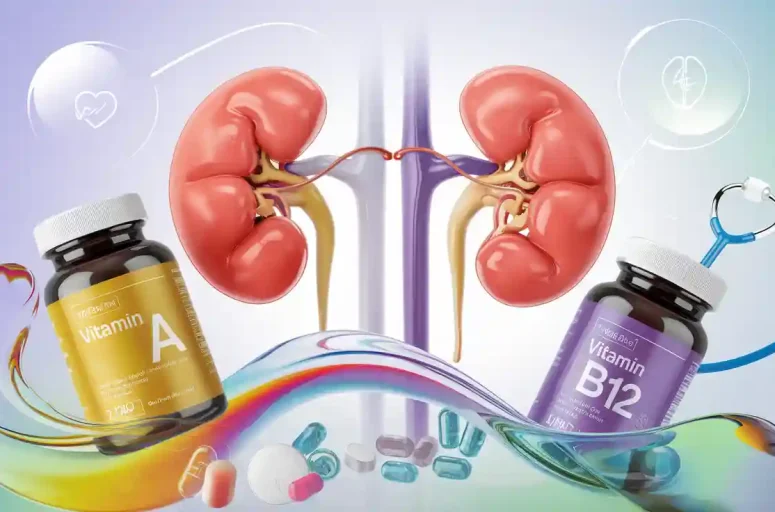
You often hear about prebiotics, probiotics, and postbiotics, but each plays a unique role in your gut health. Prebiotics serve as food for probiotics, which are live microbes. These probiotics then produce postbiotics, which are beneficial compounds offering numerous postbiotics benefits. This continuum supports your gut, immunity, and even brain function. Many people now choose postbiotics because of their stability and the growing evidence of their postbiotics benefits.
Supplement Type | Market Trend | Key Benefits |
|---|---|---|
Prebiotics | Steady | Nourish good bacteria |
Probiotics | Popular | Support gut and immune health |
Postbiotics | Fast-growing | Gut barrier, immunity, safety |
You may find postbiotics safer if you have a sensitive gut or immune system. Always consult your healthcare provider before starting any supplement.
This information is for educational purposes only. Please talk to your doctor for personal advice.
Key Takeaways
Prebiotics feed good gut bacteria and help improve digestion, mineral absorption, and blood sugar control.
Probiotics are live beneficial bacteria that support your gut balance, boost immunity, and may relieve IBS symptoms.
Postbiotics are safe compounds made by probiotics that strengthen your gut barrier, reduce inflammation, and fight harmful bacteria.
Combining prebiotics, probiotics, and postbiotics offers the best support for gut health and overall well-being.
People with sensitive guts or weak immune systems may find postbiotics safer than probiotics.
Eating fiber-rich foods and fermented products naturally provides prebiotics and probiotics for a healthy gut.
Always consult your healthcare provider before starting supplements, especially if you have health conditions or take medications.
Choosing the right supplement depends on your health needs, such as digestive issues, metabolism, immunity, or special conditions.
Overview
Definitions
Prebiotics
You encounter prebiotics every day in foods like onions, garlic, and bananas. Prebiotics are special types of carbohydrates that your body cannot digest. Instead, they travel to your colon, where they become food for beneficial gut microbiota. Leading health organizations define prebiotics as substrates selectively utilized by host microorganisms that confer a health benefit. Unlike regular fiber, prebiotics must show a positive impact on your gut microbiome and overall health in scientific studies.
Probiotics
Probiotics are live microorganisms, often found in fermented foods such as yogurt, kefir, and sauerkraut. When you consume probiotics in adequate amounts, they provide health benefits by supporting your digestive system and immune function. According to scientific definitions, probiotics must demonstrate a health benefit for the host. These friendly bacteria, like Lactobacillus and Bifidobacterium, help balance your gut microbiota and promote a healthy gut environment.
Postbiotics
Postbiotics are preparations of inanimate microorganisms and their components. You do not consume live bacteria when you take postbiotics. Instead, you receive beneficial compounds produced by probiotics during fermentation. Health experts say postbiotics must show a health benefit and contain inactivated microbes or their structures. These compounds, such as short-chain fatty acids, help strengthen your gut barrier and support immune health.
Table: Scientific Definitions of Prebiotics, Probiotics, and Postbiotics
Term | Scientific Definition | Key Features |
|---|---|---|
Prebiotics | Substrates selectively utilized by host microorganisms that confer a health benefit. | Must show beneficial impact on resident microbiota and health benefit in the same study. |
Probiotics | Live microorganisms that, when administered in adequate amounts, confer a health benefit on the host. | Must demonstrate health benefit; updated definition from FAO/WHO. |
Postbiotics | Preparations of inanimate microorganisms and/or their components that confer a health benefit on the host. | Made from inactivated microbes retaining cells or structures; must demonstrate health benefit. |
Continuum
You can think of prebiotics, probiotics, and postbiotics as parts of a natural cycle in your digestive system. Prebiotics serve as nourishment for beneficial gut bacteria, especially probiotics. When you eat foods rich in prebiotics, these compounds reach your colon intact. There, probiotics—like Bifidobacteria and Lactobacilli—ferment prebiotics and produce postbiotics. This process creates bioactive molecules, such as short-chain fatty acids, that help regulate your immune system and support gut health.
Your gut microbiome relies on this continuum for balance and resilience. Prebiotics feed probiotics, which then create postbiotics. Each component plays a unique role in maintaining your gut microbiota and digestive system. Research shows that this triad supports your overall health by modulating the gut microbiota-immune system axis. You benefit from improved digestion, stronger gut barrier function, and enhanced immune responses.
Quick Summary of the Continuum:
You consume prebiotics from foods or supplements.
Probiotics in your gut microbiota use prebiotics as fuel.
Probiotics metabolize prebiotics and produce postbiotics.
Postbiotics deliver health benefits by supporting your digestive system and immune function.
📝 Tip: Including all three—prebiotics, probiotics, and postbiotics—in your diet can help you maintain a healthy gut microbiome and support your overall well-being.
Health Benefits
Prebiotics
Gut Health
You support your gut health by including prebiotics in your diet. These special fibers feed your beneficial gut microbiota, helping them grow and thrive. When you eat foods rich in prebiotics, you encourage the growth of healthy gut bacteria, which leads to a more balanced gut microbiome. Clinical studies show that prebiotic supplementation can improve gut health outcomes, especially in people with metabolic challenges. For example, the Food4Gut multicenter trial found that inulin and other prebiotic fibers improved insulin resistance, reduced inflammation, and even helped with sleep quality in obese patients. Another clinical trial in Tunisia showed that prebiotics like carob fiber decreased fat mass and improved sleep and psychological well-being.
Study/Trial | Population | Intervention | Outcomes Measured | Key Findings |
|---|---|---|---|---|
Food4Gut multicenter randomized placebo-controlled trial | Obese patients | Inulin and other prebiotic fibers | Insulin resistance, fasting blood glucose, inflammation markers, body composition, psychological profiles (sleep quality) | Significant improvements in metabolic parameters and psychological outcomes; modulation of gut microbiota and inflammatory cytokines |
Interventional clinical trial in Tunisia | 45 obese patients divided into 3 groups: diet only, prebiotic (30g carob/day), probiotic | Prebiotic supplementation (carob fiber) vs diet alone and probiotics | Weight, BMI, waist circumference, fat mass, muscle strength, insulinemia, HOMA-IR, fasting blood glucose, sleep quality, depression, anxiety, stress | Prebiotic group showed significant decrease in fat mass, insulin resistance (HOMA-IR), improved sleep quality; probiotics improved fasting glucose; all groups lost weight and improved psychological scores |
These results highlight the health benefits of prebiotics for your gut microbiota, metabolism, and overall well-being.
Mineral Absorption
You can also boost mineral absorption by consuming prebiotics. Research shows that prebiotics, especially nondigestible oligosaccharides, help your body absorb minerals like calcium, magnesium, zinc, and iron. This effect happens because prebiotics increase mineral solubility, stimulate the growth of intestinal cells, and enhance the expression of calcium-binding proteins. They also help break down phytic acid, which can block mineral absorption. Human studies confirm that prebiotics can improve mineral uptake, though results vary based on age, diet, and the type of prebiotic used. When you combine prebiotics with a diet high in calcium, you may see even greater benefits for bone health.
Prebiotics improve mineral absorption and metabolism, including calcium, magnesium, zinc, and iron.
The effectiveness depends on the type and dose of prebiotic, dietary calcium, age, and physiological status.
Mechanisms include increased mineral solubility, enhanced intestinal cell growth, and improved gut health.
Synbiotics (prebiotics plus probiotics) may offer additional benefits.
Blood Sugar
You may notice better blood sugar control when you add prebiotics to your diet. Scientific consensus supports the role of prebiotics in regulating blood sugar, especially for people with type 2 diabetes. Prebiotics help balance your gut microbiota and reduce inflammation in your digestive system. They also increase hormones that lower blood glucose, such as GLP-1 and GIP, and may inhibit enzymes involved in carbohydrate metabolism. Clinical trials show that prebiotics like inulin and fructooligosaccharides improve glycemic control and reduce inflammation. These health benefits make prebiotics a promising option for supporting blood sugar regulation.
Probiotics
Immunity
You can strengthen your immune system by taking probiotics. Several randomized controlled trials show that probiotics, such as Lactobacillus and Bifidobacterium strains, boost immune responses in elderly people. For example, Lactobacillus plantarum reduced infection rates and pneumonia mortality in institutionalized seniors. Other studies found that probiotics improved responses to flu vaccines and increased secretory IgA levels, which protect your mucosal surfaces. Probiotics also help modulate inflammation and support your immune system in people with chronic conditions like multiple sclerosis.
Probiotics reduce infection incidence and mortality in elderly populations.
They enhance immune responses to vaccines.
Probiotics increase protective antibodies in the gut and saliva.
They help modulate inflammation and improve clinical outcomes in chronic diseases.
IBS Relief
If you struggle with irritable bowel syndrome (IBS), probiotics may help relieve your symptoms. Research shows that certain probiotic strains can reduce abdominal pain and improve other IBS symptoms. A systematic review of 42 randomized controlled trials found that nine types of probiotics, including B. coagulans, L. plantarum, and S. boulardii, significantly reduced abdominal pain. Most studies reported only mild side effects, and no serious safety concerns appeared.
Probiotic Strain | Evidence of Efficacy for IBS Symptoms | Outcome Measured | Safety Profile |
|---|---|---|---|
B. coagulans MTCC5260 | Significant reduction in abdominal pain | Abdominal pain relief | Mild to moderate adverse events; no significant difference vs controls |
L. plantarum 299v | Significant reduction in abdominal pain | Abdominal pain relief | Mild to moderate adverse events; no significant difference vs controls |
S. boulardii CNCM I-745 | Significant reduction in abdominal pain | Abdominal pain relief | Mild to moderate adverse events; no significant difference vs controls |
S. cerevisiae CNCM I-3856 | Significant reduction in abdominal pain | Abdominal pain relief | Mild to moderate adverse events; no significant difference vs controls |
Other probiotics (total 9 types) | At least one IBS symptom outcome improved | Various IBS symptom measures | Mild to moderate adverse events; no significant safety concerns |
You may experience relief from IBS symptoms by choosing the right probiotic strain, but results can vary.
Safety
Most people tolerate probiotics well, but you should know about possible risks. Minor side effects include abdominal cramping, nausea, soft stools, and flatulence. Rarely, probiotics can cause serious infections like bacteremia or fungemia, especially in people with weakened immune systems, heart disease, or compromised gut barriers. Some cases of d-lactic acidosis have been reported in patients with short bowel syndrome. Theoretical risks include gene transfer of antibiotic resistance, but no clinical cases have been documented. If you belong to a vulnerable group, consult your healthcare provider before starting probiotics.
🛑 Note: Probiotics may not be safe for everyone. Always talk to your doctor if you have a weakened immune system or other health concerns.
Postbiotics Benefits
Gut Barrier
You can support your gut barrier by using postbiotics. Scientific studies show that postbiotics, such as short-chain fatty acids and surface-layer proteins, strengthen tight junctions between intestinal cells. These compounds help your digestive system by providing energy to gut cells, promoting the growth of beneficial bacteria, and reducing inflammation. Postbiotics also help your gut barrier resist harmful pathogens, which keeps your gut health in balance.
Anti-inflammatory
You may benefit from the anti-inflammatory effects of postbiotics. Animal studies show that postbiotics reduce inflammation and oxidative stress in models of colitis. Postbiotics modulate genes related to inflammation, such as Nrf2 and NF-κB, and decrease inflammatory cell infiltration. In direct comparisons, postbiotics sometimes outperform probiotics in reducing gut inflammation and improving gut microbiota balance. These findings highlight the unique health benefits of postbiotics for people with inflammatory gut conditions.
Antimicrobial
Postbiotics offer antimicrobial benefits by fighting harmful bacteria in your gut. Research shows that postbiotics from strains like Lacticaseibacillus casei and Lactobacillus bulgaricus inhibit pathogens such as Staphylococcus aureus and Escherichia coli. These effects come from bioactive compounds like organic acids, hydrogen peroxide, and bacteriocins. Postbiotics can even enhance the effectiveness of antibiotics, making them a promising option for managing infections and supporting gut health.
Postbiotics inhibit foodborne pathogens, including E. coli, Salmonella, and Listeria.
Organic acids and bacteriocins disrupt pathogen membranes and prevent biofilm formation.
Postbiotics may work synergistically with antibiotics.
Safety Advantages
You may find postbiotics safer than probiotics, especially if you have a sensitive immune system or belong to a vulnerable group. Postbiotics do not contain live bacteria, so they do not carry the risk of infection. Regulatory agencies have approved inactivated strains, such as pasteurized Akkermansia muciniphila, for use in foods because of their safety profile. Clinical data show that postbiotics can reduce diarrhea and improve gut health in sensitive populations without the risks linked to live probiotics. These postbiotics benefits make them an attractive choice for people seeking safe and effective support for their gut microbiota and immune system.
ℹ️ Medical Disclaimer: This information is for educational purposes only and does not constitute medical advice. Please consult a healthcare professional for personalized recommendations.
Comparison

Key Differences
You may wonder how prebiotics, probiotics, and postbiotics differ in their roles and effects. Each one supports your gut and immune system in a unique way. The table below highlights their main differences:
Category | Prebiotics | Probiotics | Postbiotics |
|---|---|---|---|
Definition | Non-digestible plant fibers that feed good bacteria | Live beneficial bacteria that colonize your gut | Inactive microbial cells and metabolites from fermentation |
Primary Function | Promote growth of probiotics | Maintain gut balance, support digestion and immunity | Provide bioactive compounds for gut and immune health |
Mechanism | Compete with harmful bacteria, modulate immune response | Deliver microbial metabolites without live bacteria | |
Health Benefit | Indirectly improve digestion and immunity | Directly support digestion, immunity, and inflammation | Directly support gut barrier and immune system |
Synergy | Enhance probiotic survival and function | Work best with prebiotics (synbiotics) | Result from probiotic-prebiotic interaction |
Prebiotics act as food for probiotics. Probiotics are live bacteria that help balance your gut. Postbiotics are the beneficial products made by probiotics. You get the most benefits when you include all three in your diet.
Risks
You should know the possible risks before choosing any supplement. Most people tolerate prebiotics, probiotics, and postbiotics well, but some groups need extra caution.
Prebiotics: If you take too much, you may experience gas or diarrhea. Prebiotics do not cause allergies or promote antibiotic resistance. You can usually use them safely at recommended doses.
Probiotics: Most healthy people tolerate probiotics, but risks increase for certain groups. People with weak immune systems, advanced age, or serious illnesses may face rare but serious infections. These include sepsis or pneumonia. Probiotics can also carry antibiotic resistance genes if not properly screened. Always check product quality and consult your doctor if you belong to a vulnerable group.
Postbiotics: You rarely see side effects with postbiotics. Because they do not contain live bacteria, they do not cause infections. This makes them a safer choice for people with sensitive guts or immune systems.
⚠️ Note: If you have a weakened immune system, are very young or elderly, or have a serious illness, talk to your healthcare provider before using any of these products.
Best Uses
You can choose the right option based on your health needs and lifestyle. Here are some common scenarios:
Digestive Disorders
Probiotics help with irritable bowel syndrome (IBS) and inflammatory bowel disease (IBD). Certain strains reduce inflammation and restore gut barrier function.
Postbiotics benefit people with gut inflammation or those who cannot tolerate live bacteria, such as in cases of severe dysbiosis or food sensitivities.
Prebiotics support regularity and help with chronic constipation by feeding good bacteria.
Metabolic Health
Prebiotics like inulin and oligofructose help manage weight and improve blood sugar control. They promote the growth of bacteria that produce short-chain fatty acids, which support metabolism.
Probiotics also support weight loss and improve metabolic markers in type 2 diabetes.
Both prebiotics and probiotics can work together for better results.
Immune Support
Probiotics and prebiotics help balance your immune system. They may reduce allergies and support your body’s defense against infections.
Postbiotics provide direct support to your immune system, especially if you cannot tolerate live bacteria.
Special Populations
Postbiotics are ideal for people who cannot tolerate live probiotics, such as those with small intestinal bacterial overgrowth (SIBO), severe gut dysbiosis, or fiber intolerance.
Probiotics require careful selection and monitoring in vulnerable groups, including infants, elderly, and immunocompromised individuals.
Prebiotics are generally safe but may cause discomfort if you have a sensitive gut.
Women’s Health
Probiotics help prevent and treat vaginal infections by restoring natural bacterial balance.
Mental Health
Both probiotics and prebiotics influence the gut-brain axis. They may help reduce symptoms of depression, anxiety, and stress.
💡 Tip: You may get the best results by combining prebiotics, probiotics, and postbiotics. This approach supports your gut microbiome from multiple angles.
Medical Disclaimer: This information is for educational purposes only. It does not replace medical advice. Please consult your healthcare professional for personalized recommendations.
Usage
Food Sources
Prebiotics
You can find prebiotics in many common foods. These special fibers help nourish the good bacteria in your gut. Try adding the following foods to your meals:
Artichokes
Asparagus
Bananas
Barley
Berries
Chicory root
Garlic
Green vegetables
Legumes
Linseed
Oats
Onions
Tomatoes
Wheat
Eating a variety of these foods supports your gut health and helps your beneficial bacteria thrive.
Probiotics
You can boost your intake of probiotics by choosing fermented foods. These foods contain live beneficial bacteria that support your digestive system. Some popular options include:
Yogurt
Kefir
Sauerkraut
Kimchi
Tempeh
Kombucha
Miso
Pickles
Sourdough bread
Including these foods in your diet can help maintain a healthy balance of gut bacteria.
Postbiotics
You do not find postbiotics directly in foods. Instead, your gut bacteria produce postbiotics when they digest prebiotics. These beneficial compounds, such as short-chain fatty acids and vitamin K, support your gut barrier and immune system.
Category | Common Food Sources |
|---|---|
Prebiotics | Wheat, onions, banana, garlic, leeks, chicory root, artichokes, asparagus, barley, berries, green vegetables, legumes, linseed, oats, tomatoes |
Probiotics | Yogurt, kefir, sauerkraut, kimchi, tempeh, kombucha, miso, pickles, sourdough bread |
Postbiotics | Not directly found in foods; produced by gut bacteria after digesting prebiotics |
Supplements
Choosing Products
When you select probiotic supplements, look for products that list the specific strains and their amounts. Reliable probiotic products should provide clear information about the strains used, their safety, and the clinical evidence supporting their benefits. You should also check that the supplement is shelf-stable and free from allergens or unwanted additives. For best results, choose probiotic supplements that contain multiple strains to support digestive diversity.
Dosage
Most clinical studies recommend a daily dose of 10^8 to 10^11 CFU for probiotic supplements. This range helps ensure enough live bacteria reach your gut. For postbiotic supplements, research shows that a 2000 mg daily dose of a product containing short-chain fatty acids and exopolysaccharides is effective. Always follow the manufacturer’s instructions and consult your healthcare provider for personalized advice, as recommended dosages for prebiotics and probiotics can vary.
Safety Tips
Vulnerable Groups
You should take extra care if you belong to a vulnerable group. This includes people who are pregnant, children, those with digestive tract disorders, structural heart problems, or weakened immune systems. Always talk to your doctor before starting any supplement, especially probiotic supplements or postbiotics. If you have recently had surgery or are on medication, professional guidance is essential.
Interactions
Probiotics can interact with certain medications. For example, they may help restore gut bacteria after antibiotics but could affect blood thinners or immunosuppressants. Prebiotics and probiotics may also influence how your body processes some drugs. You should always discuss supplement use with your healthcare provider, especially if you take prescription medications.
⚠️ Medical Disclaimer: This information is for educational purposes only and does not replace medical advice. Always consult your healthcare professional for personalized recommendations.
You now know that prebiotics feed your gut bacteria, probiotics add live helpful microbes, and postbiotics deliver useful byproducts. Experts suggest eating a variety of fiber-rich foods and fermented products for a balanced gut. For mood support, recent studies show probiotics and synbiotics help more than prebiotics. Always match supplements to your health goals and talk to your doctor before starting any new regimen.
Medical Disclaimer: This blog is for informational purposes only. Please consult a healthcare professional for personalized advice.
Intervention | Number of Studies | Effect on Depressive Symptoms | SMD [95% CI] | P-value |
|---|---|---|---|---|
Probiotics | 11 | Significant improvement | -0.32 [-0.48 to -0.16] | <0.01 |
Prebiotics | 3 | No significant effect | -0.08 [-0.39 to 0.23] | 0.62 |
Synbiotics | 3 | Significant improvement | -1.09 [-1.45 to -0.73] | <0.001 |
FAQ
What is the best time to take prebiotics, probiotics, or postbiotics?
You can take these supplements at any time of day. Many people take probiotics with meals to help survival through stomach acid. Prebiotics and postbiotics do not require special timing.
Can you take prebiotics, probiotics, and postbiotics together?
Yes, you can take all three together. This combination supports your gut health from different angles. Many experts call this approach “synbiotics” when you combine prebiotics and probiotics.
Are postbiotics safe for children?
Postbiotics usually have a good safety profile for children. They do not contain live bacteria, so they carry less risk of infection. Always check with your pediatrician before starting any supplement.
Do you need supplements if you eat a healthy diet?
You may not need supplements if you eat a variety of fiber-rich and fermented foods. Supplements can help if you have specific health needs or dietary gaps. Ask your healthcare provider for advice.
Can postbiotics help with food allergies?
Some studies suggest postbiotics may reduce inflammation and support immune balance. This could help with food allergies. More research is needed before experts recommend postbiotics for this purpose.
How long does it take to notice benefits?
You may notice digestive changes within a few days to weeks. Effects on immunity or mood may take longer. Results depend on your health, diet, and the product you use.
Can you take these supplements during pregnancy or breastfeeding?
Many prebiotics and probiotics are safe during pregnancy and breastfeeding. Postbiotics also show a good safety profile. Always consult your doctor before starting any supplement during these times.
⚠️ Medical Disclaimer: This FAQ is for informational purposes only. It does not replace medical advice. Please consult your healthcare professional for personalized recommendations.


